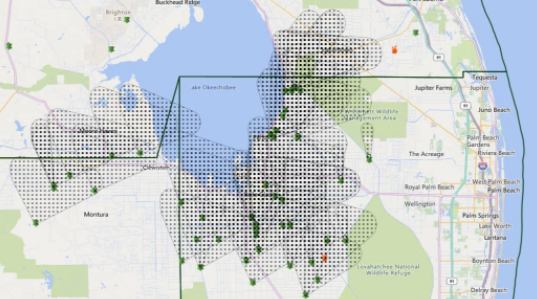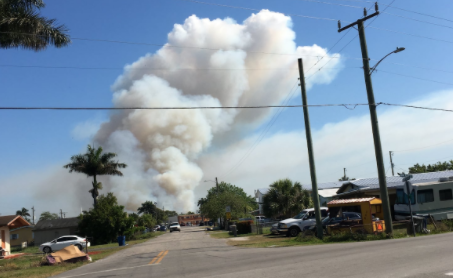Participants included Dr. Jessica McCarty, co-investigator for the NOAA NASA Fire X Field Team, associate professor and director of the Geospatial Analysis Center at the University of Miami of Ohio; Shanique Scott, former mayor of South Bay; Colin Walkes, former mayor of Pahokee; and Robert C. Mitchell, Muck City Black Lives Matter founder.
See the entire virtual press conference.
Dr. McCarty: "Sugarcane smoke plumes do not travel in a systematic way. And so having a sensor in only one location in the Everglades Agricultural Area means you're likely never going to capture the full impact of smoke and particulate pollution because the winds are so variable and can impact so many communities.
"Particulate Matter 2.5 is a very fine particle and it is known to pierce very deep into our lungs which means it can exacerbate chronic lung conditions like asthma and COPD.
"You don't need to burn sugar to harvest it. Yes, it's cheap and fast, but it's not necessarily the cheapest in the long term, because it reduces your yield and your soil carbon, and with the peat soils in South Florida, they're actually reducing their own soil fertility by burning it.
"There is also a growing demand for biomass — the trash leaves on the sugarcane itself — not only for compostable flatware and textiles, but for bioplastics as well."
Shanique Scott: "A lot of my own dance students struggle with asthma and other respiratory issues during the harvesting season.
"Even the kids have become accustomed to telling their teachers to pull down the shades because, you know, it seems like the fields and the playground areas are on fire.
"The only thing we are asking is that the sugar industry be better neighbors. If you have an alternative such as green harvesting just do it.
"It's sad that there is so much technology available out there for the industry to evolve away from burning but our community still has to fight for clean air."
Colin Walkes: "The issue we have here locally with HB 1601 (or any bill for that matter) is that it precludes us as citizens locally from pursuing any recourse or redress from any practice used by our sugar industry which harms our community.
"We have our ag commissioner Nikki Fried. We know you, Nikki. You came to our community and spoke to us. It's time for you to stand for us. I don't know if you are being brought out or being intimidated. I don't know what you're going through as an elected official. I pray for her as I pray for all elected officials because I know from experience it's a hard job, but we must stand for what's right. But you are hearing us Nikki; you are hearing us and you're not doing what's right."
Robert Mitchell: "We have political leaders in Tallahassee who put the agenda of the sugar mills higher than they do the health of the people.
"We are in a pandemic and many are suffering from respiratory problems in our communities, but we have not been given one consideration by Nikki Fried or the industry to even give us a protective buffer to stop the burn during COVID.
"In Belle Glade, there is a saying that her soil is her fortune. But I have amended that statement to say her soil and her people are her fortune, and her people have been forgotten. Bbut hopefully, this horrible bill HB1601 will not pass."
See Mitchell's full testimony.
Rep. Anna Eskamani: "It is not okay that a major industry gets to dictate policy at the local level, a state level and even a federal level just because they have the money to do that. Just because they have the money to influence politicians and even different sectors of the media.
"No one is trying to end the industry. People are just trying to end these practices that haves damaged far too many lives and far too many communities.
"The reality is that the influence of the sugar industry goes far beyond the legislature; it also goes into the executive branches, it goes into the regulation process, to the planning of when to burn and when not to burn. There is a reason why some of the richer communities of south Florida don't experience this. It is not a coincidence. It's an intentional policy decision.
"Sugar companies could choose to switch to green harvesting, but they are far less likely to make that switch to green harvesting if the legislature gives them immunity from lawsuits and all health impacts caused by this practice."
See Rep. Eskamani's full testimony.
Rep. Omari Hardy: "What this bill does is that it not only allows this practice of sugarcane burning to continue, but it closes the doors of the courthouse to those who have been seeking justice, people, African American and people who are of color who have been harmed by this practice and all they want is to have their day in court.
"In this case, Big Sugar has come to the legislature to try and change the law in the middle of a lawsuit. It's changing the rules in the middle of the game and it's not fair and that's why this bill should not be heard, and if it's advanced it needs to be changed from its current form.
"Why should Brazil, have to beat us to the punch to ban sugarcane burning? Why does Thailand have to beat us to the punch to ban sugarcane burning? In Louisiana upwards of 65% of sugar cane is harvested green. Please explain why it can be done in other places and not here where we have fantastic research universities and we have an agriculture institute at UF which has studied this issue and have tried to create a road map for sugarcane farmers to harvest this crop in a way that doesn't harm people's health. It's because you have a powerful industry that is influencing people and has obscured the facts and science around this practice and that has tried to squash the voices of the people in Glades and pretend to paint them out as a monolith and that’s not true.
"We should not accept the narrative that says that people out in the Glades should have to choose between a good job and clean air. Between a job that helps them provide for their families and a job that harms the health of their family members. Any narrative put forward that pretends those two things are inseparable is a false narrative."
See Rep. Omari's full testimony.
Press Coverage:
People Get Sick When Sugarcane Burns. Florida Lawmakers Giving Industry a Gift, Anyway | Editorial
What Do Riots and Farming Having In Common?
Democratic Lawmakers, Advocates Say Right to Farm Bill Is Ploy to Protect Sugarcane Burning
Florida Legislator: House Bill 1601 a Dangerous Piece of Legislation
Florida 'Right to Farm' Bill Protects the Right to Harm
After Sugar’s $11 Million Flex, Florida Lawmakers Push to Protect Industry
“Right To Farm” Law Unfairly Favors Agriculture
Critics: Farm Bill Would Allow Agriculture Operations to Pollute Florida Communities
Do Florida Lawmakers Want to Make It Harder to Sue Sugar Farmers?

